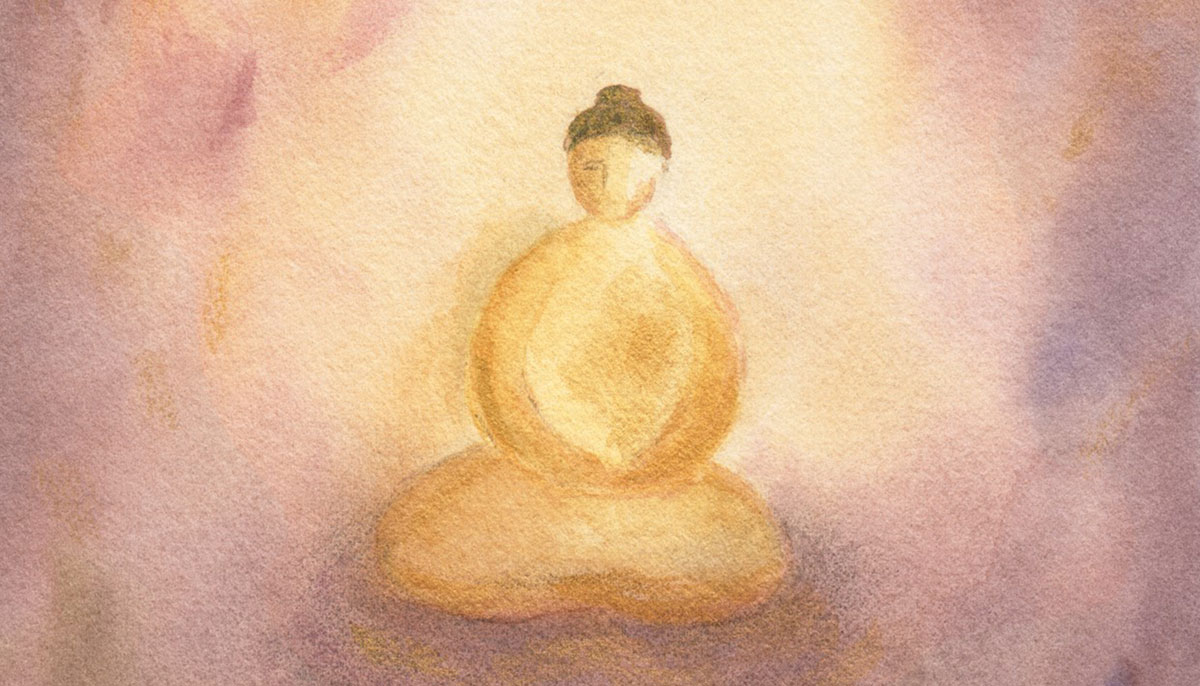For decades a prayer has circulated in the background of my daily life: May I trust my own goodness. May I see the goodness in others.
This longing emerged from a deep place of suffering I went through as a young adult. During that dark time, I felt anxious and depressed, separate from the world around me. I was continually judging myself as falling short, not good enough, doubting my basic worth. That of course kept me from feeling close and connected to others and to the world. It blocked me from feeling creative, stopped me from being fully alive.
The more you trust this loving presence as the truth of who you are, the more fully you will call it forth in yourself, and in all those you touch.
It feels like grace that this “trance of unworthiness” led me onto a spiritual path that showed me how to hold myself with compassion. This allowed me to see through the layers of judgment and doubt and to discover beneath them clarity, openness, presence, and love. Increasingly over the years, my trust in this loving awareness as the essence of who we all are has become a guiding light. No matter how wrong or lacking we may feel, how caught in separation, or how trapped by the messages, violations, and inequities of the society we live in, this basic goodness remains the essence of our Being.
A beautiful story holds within it this truth. During the mid-1950s in Bangkok, a huge clay statue of the Buddha began to crack due to heat and drought. When some monks arrived to investigate, they shined a flashlight into the largest of the cracks. What they saw surprised everyone. Deep under the gray clay was the gleam of gold.
No one had known that inside this popular but ordinary looking statue was a solid gold Buddha. As it turns out, the statue had been covered with plaster and clay six hundred years earlier to protect it from invading armies. Although all the monks who lived in the monastery at that time had been killed in the attack, the golden Buddha, its beauty and value covered over, had survived untouched.
Just as the monks disguised the beauty of the golden Buddha in order to protect it during dangerous times, we cover our own innate purity and goodness as we encounter a challenging world. As children, many of us were criticized, ignored, misunderstood, or abused, leading us to doubt that gold within us. As we grow up, we increasingly internalize the judgments and values of our society, further losing touch with our innocence, our creativity, and our tender hearts. We cover over the gold as we seek the approval of others, looking to them to measure our worth—to determine whether we are good enough, smart enough, successful enough. And if we are part of a nondominant group in our culture, we take on additional layers of protection to help us face the violence of social injustice and oppression.
Adding layer after layer to protect ourselves, we become identified with our coverings, believing ourselves to be separate, threatened, and deficient. Yet even when we cannot see the gold, the light and love of our true nature cannot be dimmed, tarnished, or erased. It calls to us daily through our longing for connection, our urge to understand reality, our delight in beauty, our natural desire to help others. Our deepest intuition is that there is something beyond our habitual story of a separate and isolated self: something vast, mysterious, and sacred.
What helps us uncover that gold? How can we learn to trust the pure awareness and love, the basic goodness that is our very essence? How can our lives be an active expression of our natural wisdom and kindness? And how can we respond with a wise heart to the human ignorance, greed, and hatred that perpetuates violence toward each other, racial and other caste systems, cruelty toward nonhuman animals, and destruction of our living earth? These questions have shaped my spiritual path.
The basic teachings of the Buddha awaken us to who we are. They begin with learning to recognize the Truth of our experience by opening to life, just as it is. Then we discover how to awaken our inherent capacity to meet this ever-changing life with Love. This unfolding of presence and love reveals the Freedom of our true nature.
Even though the gold of your true nature can get buried beneath fear, uncertainty, and confusion, the more you trust this loving presence as the truth of who you are, the more fully you will call it forth in yourself, and in all those you touch. And in our communities, as we humans increasingly remember that gold, we’ll treat each other and all beings with a growing reverence and love.
Our Basic Goodness
The gold of our true nature can never be tarnished. No matter how it might get covered over or disguised by feelings of anger, deficiency, or fear, our awareness remains radiant and pure. In the moments of remembering and trusting this basic goodness of our Being, the grip of “something’s wrong” dissolves and we open to happiness, peace, and freedom.
I could have done that better. I should have gotten more done. I wish I had been more sensitive. For many years, “never enough” was a chronic habit of my mind, and I could run endless variations on the theme. Finally one night before going to bed, I sat down and asked myself: “Okay, what would be enough? What do I have to do to be good enough?”
Over the next weeks I started tracking what happened after I’d completed a successful weekend of teaching, or after receiving feedback about contributing to others’ well-being, or after being particularly kind or generous with someone. The enough feeling would last for about 2.4 minutes before I’d start fixating on what else I needed to do, how I needed to prepare for the next event, how I needed to be more consistently sensitive and kind. Even the most satisfying accomplishments, upon close inspection, would seem tainted by ego, and therefore not spiritual enough. Whatever I was doing, it didn’t leave me with an enduring sense of enough.
Since that long-ago evening when I faced the never-ending narrative of falling short, I have discovered that enoughness has absolutely zero to do with accomplishing, nothing to do with achieving, and is not at all about trying to be good enough. Rather, the realization of enough is right here in the fullness of presence, in the tenderness of an open heart, in the silence that is listening to this life. These are the moments when the glow of gold shines through.
Reflection
Pause and let yourself sink into this moment, into presence, into your heart.
Gently say to yourself, “There’s nothing to do. This is enough…I am enough.”
Feel the fullness and peace of coming home.
Excerpted from Trusting the Gold: Uncovering Your Natural Goodness by Tara Brach. © 2021 by Tara Brach. Illustration © 2021 by Vicky Alvarez. Published by Sounds True. soundstrue.com

